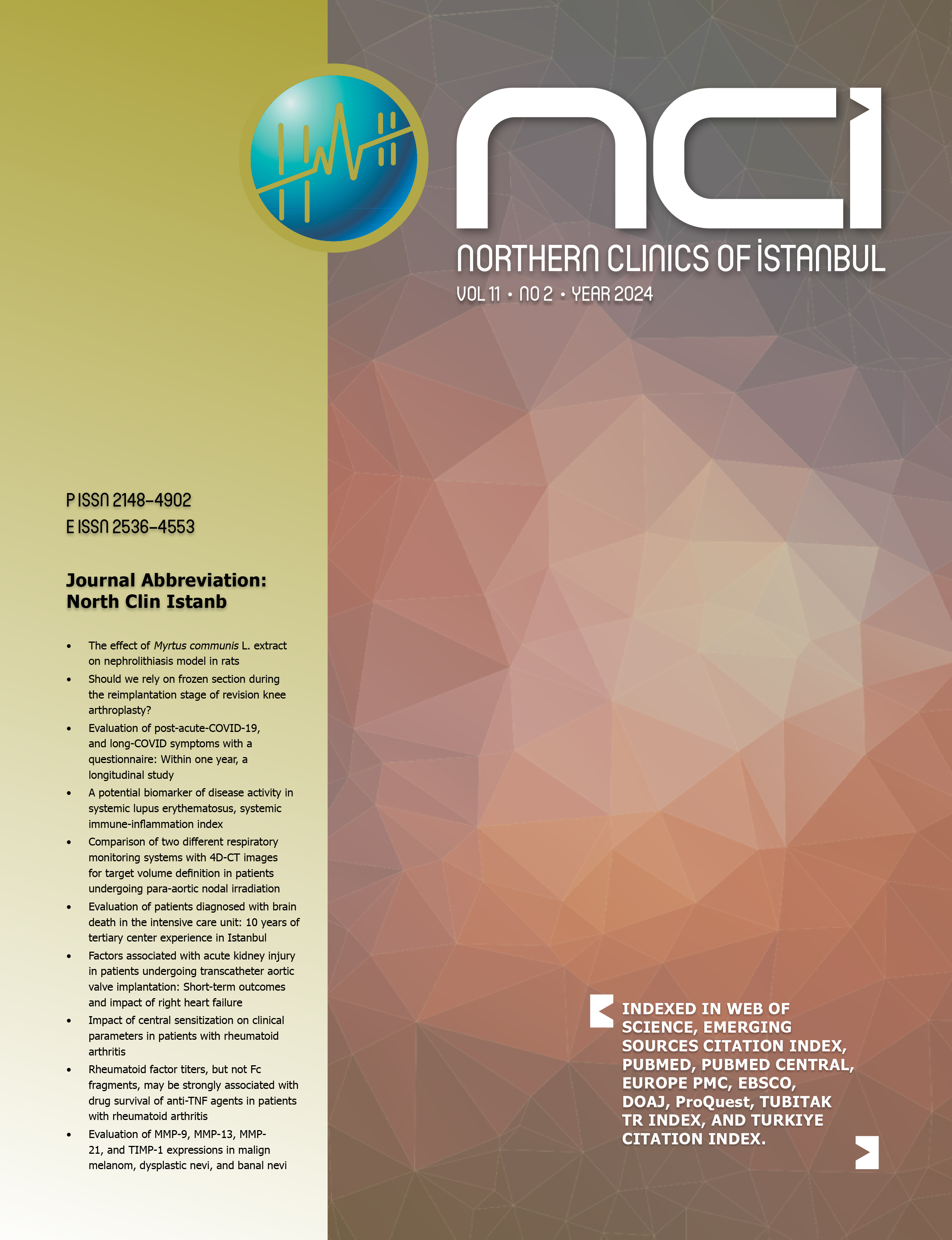Determining the effectiveness of a virtual service / patient-based education program on patient care and clinical decision making in nursing: A quasi-experimental study
Taner Onay, Mehmet Ali Gulpinar, Merve Saracoglu, Esra AkdenizDepartment of Medical Education, Marmara University Faculty of Medicine, Istanbul, TurkiyeOBJECTIVE: The aim of this study was to determine the effectiveness of a virtual service/patient-based program (vSPBP) developed for nursing education and its effect on the development of care plan preparation and clinical decision-making skills.
METHODS: The study was conducted in a quasi-experimental design with a sample of fourth-year nursing students. Partici-pants were assigned to the intervention group (n=44) and control group (n=51). The intervention group participated in a full-day vSPBP in addition to clinical training, whereas the control group received only the clinical training. Both groups were evaluated at the end of the intervention for care planning skills and at the beginning, middle, and end of the academic year for clinical decision-making skills. The Modified Simulation Effectiveness Tool (mSET) and focused group interview were used to evaluate the effectiveness of the vSPBP; nursing students Clinical Decision-Making in Nursing Scale (CDM-NS) and Care Plan Evaluation Form were used to evaluate learning outcomes. Quantitative data were analyzed using the t-test and ANOVA. Qualitative data were analyzed by three researchers, and themes were identified. Ethical permissions were obtained from the relevant units.
RESULTS: The total score of the Turkish Version of the mSET was 84.39±12.08 (51-95) and the education program was found to be highly effective. The mean care plan preparation skills scores of the intervention and control groups were 44.84±2.77 and 27.75±4.28 (0-50), respectively, and the total scores of the CDM-NS (at the last measurement) were 147.90±11.28 and 146.42±12.21. While there was a significant difference between the intervention and control groups in the ability to prepare a care plan (p=0.001), there was no difference between the groups in clinical decision-making skills over time (p=0.433), between the second and third measurements over time (p>0.05), but both measurements increased significantly compared with the first measurement (p=0.000).
CONCLUSION: The vSPBP was determined to be an effective learning activity for the development of care plan preparation and clinical reasoning skills, as well as effective in closing the gap between theoretical and clinical knowledge and adaptation to the nursing process when applied in an integrated manner with the existing nursing program.
Keywords: Clinical decision-making; nursing care plan; nursing education; serious game; simulation-based learning; virtual patient.
Hemşirelikte hasta bakımı ve klinik karar vermeye ilişkin sanal servis/hasta tabanlı eğitim progamının etkinliğinin saptanması: Yarı deneysel çalışma
Taner Onay, Mehmet Ali Gulpinar, Merve Saracoglu, Esra AkdenizMarmara Üniversitesi Tıp Fakültesi, Tıp Eğitimi Anabilim Dalı, İstanbulAmaç: Çalışmanın amacı hemşirelik eğitimi için bakım vermeye yönelik geliştirilen sanal servis ve hasta tabanlı eğitim programının etkinliğinin ve hemşirelik öğrencilerinde bakım planı hazırlama ve klinik karar verme becerisinin gelişimine etkisinin saptanmasıdır.
Yöntem: Çalışma yarı deneysel bir tasarımda, hemşirelik bölümünden 95 dördüncü sınıf öğrencisinin katıldığı bir örneklemle gerçekleştirildi. Katılımcılar, müdahale grubu (n=44) veya kontrol grubuna (n=51) atandı. Müdahale grubu klinik eğitime ek olarak sanal servis ve hasta tabanlı tam gün süren eğitim programına katılırken, kontrol grubu sadece klinikte mevcut eğitimi aldı. Her iki grup bakım planı becerisi için uygulama sonunda, klinik karar verme becerisi için eğitim-öğretim yılı başında, ortasında ve sonunda değerlendirildi. Eğitim programının etkinliğini değerlendirmek amaçlı Modifiye Simülasyon Etkililik Aracı ve Yarı Yapılandırılmış Kullanıcı Görüş Formu; eğitim çıktılarını değerlendirmek için Hemşirelik Öğrencilerinin Klinik Karar Verme Ölçeği ve Bakım Planı Değerlendirme Formu kullanıldı. Nicel veriler t-testi ve ANOVA ile analiz edildi. Nitel veriler üç araştırıcı tarafından analiz edilerek tema ve yan temaler belirlendi. İlgili birimlerden etik izinler alındı.
Bulgular: Çalışma ile Modifiye Simülasyon Etkililik Aracı puan toplamı 84.39±12.08 (51-95) alarak hesaplandı ve eğitim programının yüksek derecede etkili olduğu saptandı. Müdahale ve kontrol grubunun, sırasıyla, bakım planı hazırlama becerileri ortalama puanları 44.84±2.77 ve 27.75±4.28 (0-50), Hemşirelikte Klinik Karar Verme Ölçeği toplam puanları (son ölçümde) 147.90±11.28 ve 146.42±12.21 olarak hesaplandı. Müdahale grubu ve kontrol grubu arasında bakım planı hazırlama becerisinde anlamlı bir fark saptanırken (p=0.001) klinik karar verme becerileri arasında grupların zamanla arasında fark saptanmazken (p=0.433), zamana bağlı ikinci ve üçüncü ölçümün birbiri arasında anlamlı bir fark saptanmadı (p>0.05), ancak her iki ölçümün birinci ölçüme göre anlamlı bir şekilde yükseldiği saptandı (p=0.000).
Sonuç: Sanal servis ve hasta tabanlı eğitim programı bakım planı hazırlama ve klinik akıl yürütme becerilerinin geliştirilmesi için etkili bir öğrenme uygulaması olmanın yanı sıra, mevcut programla entegre bir şekilde uygulandığında teorik ve klinik arasındaki açığın kapatılması ve hemşirelik sürecine uyum konusunda etkin olduğu belirlendi. (NCI-2024-6-5)
Anahtar Kelimeler: Klinik karar verme; hemşirelik bakım planı; hemşirelik eğitimi; ciddi oyun; simülasyon tabanlı öğrenme; sanal hasta.
Manuscript Language: English





















